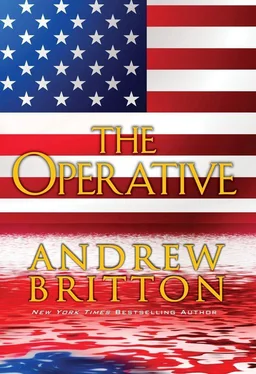Andrew Britton - The Operative
Здесь есть возможность читать онлайн «Andrew Britton - The Operative» весь текст электронной книги совершенно бесплатно (целиком полную версию без сокращений). В некоторых случаях можно слушать аудио, скачать через торрент в формате fb2 и присутствует краткое содержание. Жанр: Триллер, на английском языке. Описание произведения, (предисловие) а так же отзывы посетителей доступны на портале библиотеки ЛибКат.
- Название:The Operative
- Автор:
- Жанр:
- Год:неизвестен
- ISBN:нет данных
- Рейтинг книги:5 / 5. Голосов: 1
-
Избранное:Добавить в избранное
- Отзывы:
-
Ваша оценка:
- 100
- 1
- 2
- 3
- 4
- 5
The Operative: краткое содержание, описание и аннотация
Предлагаем к чтению аннотацию, описание, краткое содержание или предисловие (зависит от того, что написал сам автор книги «The Operative»). Если вы не нашли необходимую информацию о книге — напишите в комментариях, мы постараемся отыскать её.
The Operative — читать онлайн бесплатно полную книгу (весь текст) целиком
Ниже представлен текст книги, разбитый по страницам. Система сохранения места последней прочитанной страницы, позволяет с удобством читать онлайн бесплатно книгу «The Operative», без необходимости каждый раз заново искать на чём Вы остановились. Поставьте закладку, и сможете в любой момент перейти на страницу, на которой закончили чтение.
Интервал:
Закладка:
His gut told him the guys weren’t hiding anything.
“Call me if something comes up,” Gilbert said.
“Yes, sir.” Jenkins replied.
Gilbert left the antechamber and walked to his office. Assuming the two men were telling the truth, he reverse engineered what might have occurred. Someone wanted nukes. Trask wanted to make sure they got them for reasons yet to be determined. The drivers were told they were delivering electronic devices. What if that information were false? What if someone at Trask-not the Shotgun-had disconnected the GPS devices on the Sea Burst prototypes? Fewer people would have to be involved with stealing two hot devices than with arming two “dummy” devices to make them hot.
But what about the missing inventory alert?
Was that an oversight, a screwup that some in-house nuke-stealing son of a bitch was supposed to have covered? Or hadn’t it been worth the bother? The loss of the nukes would have been discovered when the van got to White Sands in another day or so. The drivers would have been blamed, interrogated, and would have said exactly what they were saying now.
But what if “tomorrow” had been too late to take any action? What if someone was planning to transport-or worse, use-the nukes before then?
Had the nukes even been on the van, or was that a misdirection, as well? Were they going to be used in Atlanta? Were they in somebody’s van, headed for Washington D.C.?
The devil’s advocacy was starting fires of suspicion rather than dousing them. As soon as he reached his office, Gilbert called Trask on his private line. The call was sent to the industrialist’s voice mail.
Gilbert hung up without leaving a message.
It was then that he allowed himself to contemplate something that made his gut burn. It was something about which studies had been conducted and white papers written: what if someone on the civilian side of things decided to use their military wherewithal to start or assemble an underground army, like al-Qaeda or Hezbollah, only with a great deal of money and a solid command structure? Was that what this was? The first major weapons delivery to a nonnational source?
Unless Trask talked to him, there was no way Gilbert could find that out. The only military oversight of the industrial, civilian world was what the industrial, civilian world allowed. He couldn’t even authorize an examination of the crates that were delivered to the two New York addresses: he would have to pass that information along to local law enforcement.
For the first time in his life, Brigadier General Arthur Gilbert wished to hell he was dead wrong about something. But all of that wouldn’t change the fact that for whatever reason, there were two nuclear weapons that could not be accounted for.
CHAPTER 29
NEW YORK, NEW YORK
Kealey did not have to study the scene to know that the situation was not contained and far from over.
He took it in at a glance, saw that the weapon the dead man carried was not the same that had been used for the Penn Station and Brooklyn Bridge shootings. He left the terminal and hurried along Forty-Second Street as he called Andrews.
“We just heard about-”
“It’s a sideshow,” Kealey told him. “Different gunman. I’m heading back to Grand Central.”
“Do you have any information about-”
“Zip,” Kealey said. “But I can’t think of anywhere else she’d go. Make sure someone tells the cops there not to stand down. There’s still a potential risk from the original shooter.”
Kealey waited while Andrews informed the president and the others, put the information out there. He was alarmed at how many people were being funneled along this one route-and he was still five avenues away. Vehicular traffic was down to a single lane as pedestrians clogged the streets.
It was a shooting gallery.
As he waited for Andrews to get back on, Kealey thought about the attacks this morning. Something was not making sense. Why would the enemy use a skilled killer for two attacks, drop in a ringer, then pick up again with the pro? Why sacrifice the Port Authority killer to take a sniper off the radar-and then put her back on again?
You wouldn’t, he thought. You’d take the opportunity to get her out with the crush of commuters. Send her somewhere else.
Or put her on another project. The one she had really been freed to undertake. The one that not just any adequate marksman could pull off.
Kealey slowed.
What the hell are they planning?
When Andrews came back on, Kealey shared the thought with him.
“We were just kicking that around ourselves,” Andrews said. “We just received an action memo from Brigadier General Arthur Gilbert at White Sands. A pair of prototype nukes that were en route to the installation never made it.”
“Projectiles?” Kealey asked.
“Damn. How did you know?”
“Just an ugly hunch,” he replied. “How are they fired?”
“Shoulder-mounted.”
“Shit.”
“They may be in New York,” Andrews said. “The drivers are in custody. They swear everything they had was off-loaded downtown.”
“Let me guess,” Kealey said. “One West Street?”
“Yeah. That was one of the addresses.”
Kealey had stopped on the corner of Fifth Avenue. The four miles from where he needed to be suddenly felt like a hundred. “Bishop is still downtown,” Kealey said. “I’m going to send him over. I’ll call you when I can.”
As he was clicking off, he heard Andrews say, “Thanks, and Godspeed.”
Reed Bishop felt like a corked bottle on the sea. He would shift and move, not always forward, as people shifted around him. And it was in one of those backward pitches, as a fire truck moved in front of him, that he lost Assistant Director Hunt.
The maneuver might have been intentional; Hunt was there and then gone. It was too clean. He had to be watching for the opportunity.
Bishop charged in that direction, shouldering through people when there wasn’t an opening. He fished out his badge, apologizing and flashing it at the same time; he didn’t want to have to stop and explain what he was doing to anyone, police or civilian. He was moving against the human wave on Frankfort Street, as people who had walked along the East River resumed making their way to and across the Brooklyn Bridge. He couldn’t imagine that all these people lived in the borough of Brooklyn; Bishop had the feeling that people just wanted to get out of Manhattan.
Or were being driven out? he wondered.
An air of relief seemed to pass over the crowd as people chattered about a gunman having been slain at the bus terminal. Bishop took out his phone, was about to call Kealey as he weaved his way past the Manhattan base of the bridge.
The phone beeped. It was Kealey.
“What happened?” Bishop said as he answered.
Kealey told him about the shooting. “I think we have a bigger problem,” he said then he proceeded to tell about the missing nukes. “Where’s Hunt?”
“Gone,” Bishop told him. “I lost him when traffic got between us.”
“Where are you now?”
“Nearly at the East River,” Bishop said. “I want to see if I can spot him.”
“Whether you see him or not, you need to get to the lab. There’s no way I can get down there now.”
“Yeah, I hear that,” Bishop said. He was nearly a half block from South Street. The broad avenue, which followed the river, looked like the top half of an hourglass with human sand pouring down. People were making the loop down Frankfort up to the entrance ramp to the bridge. Vehicular traffic was basically halted now, with horns voicing their displeasure. “Man, I don’t see how somebody in a hurry would go any way but the direction from which I was coming.”
Читать дальшеИнтервал:
Закладка:
Похожие книги на «The Operative»
Представляем Вашему вниманию похожие книги на «The Operative» списком для выбора. Мы отобрали схожую по названию и смыслу литературу в надежде предоставить читателям больше вариантов отыскать новые, интересные, ещё непрочитанные произведения.
Обсуждение, отзывы о книге «The Operative» и просто собственные мнения читателей. Оставьте ваши комментарии, напишите, что Вы думаете о произведении, его смысле или главных героях. Укажите что конкретно понравилось, а что нет, и почему Вы так считаете.












